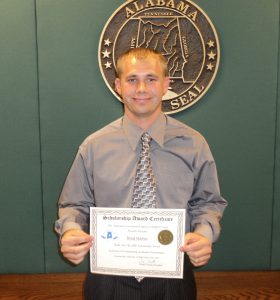Veteran Law Enforcement, Corrections Officer Inspired by Mother’s Work at DHR
By David Miller
April 28, 2020

Dr. Brad Barber’s dissertation examined officers’ workplace stress and their attitudes toward mental health services.
Brad Barber was “born into social work.”
His family has owned and operated Tri-Wil, Inc., a residential treatment facility for youth in Bibb County, for 30 years. His mother, Pamela Brown, works at Tri-Wil and previously worked for the Alabama Department of Human Resources during the much-publicized “R.C.” case that led to drastic reform in the state’s child welfare system.
“I tell people, ‘I’m 37 years old, but I’ve been around social work for 38 years,’” Barber said.
Barber, who has earned his PhD in social work and will celebrate commencement next weekend, has worked in law enforcement since 2002. He’s worked as a both a police officer and in corrections, and over the last eight months, he’s worked in a unique role with the State of Alabama’s Parole Bureau, serving as an assistant administrator of an inmate rehabilitation program in Tuscaloosa County. The program provides a variety of “wrap-around” services, from GED tutoring to job skills training, and drug treatment to anger management therapy.
Dr. Barber, though, hopes to soon transition into a new role in law enforcement, one that will allow him to replicate the impact his mother had at DHR.
“My mother was one of the pioneers of that consent decree at DHR, and that’s what gravitated me toward social work later in my life,” Barber said. “I want to do that in the law enforcement community through social work means.”
Barber’s wide range of work experience, which includes work with at-risk juveniles, can open a variety of career opportunities working with different populations. But his dissertation – a critical analysis of work stressors and support services in law enforcement – positions Barber to serve the law enforcement community itself.
Barber’s dissertation included 20 participants – police officers from nine different departments between two counties in Alabama. Barber surveyed the officers about their attitudes toward the landscape of mental health services provided by their department, particularly counseling. He found that 85 percent of the participants favored mandated counseling for all officers. Currently, officers must request counseling, but they’re hesitant to ask for help for fear of discrimination, Barber said.
 “Officers fear that, if they ask for counseling, a supervisor might think they’re unfit for duty,” Barber said. “They also don’t want to look weak in front of coworkers, so an across-the-board policy would eliminate that fear.
“Officers fear that, if they ask for counseling, a supervisor might think they’re unfit for duty,” Barber said. “They also don’t want to look weak in front of coworkers, so an across-the-board policy would eliminate that fear.
“I’ve experienced this personally. I have a PhD now, but if I have a problem, I’m still hesitant to go to a counselor.”
Integrated mental health services are rare in small law enforcement agencies, Barber said. Larger agencies rely on administration, like the police chief, to help connect an officer with a counselor, but officers “don’t want to sit down and have that conversation” with their boss. Some agencies have an Employee Assistance Program, a catch-all of services, but three of the four study participants who had an EAP option “didn’t trust it,” Barber said.
“Most police officers will agree: 95 percent of the stress comes from the administration, not from working the streets,” Barber said. “From incompetent supervisors to a lack of resources, the list goes on and on.”
Additionally, officers have a unique paradox – because so few people understand the stress of police work, they’re less likely to trust community members who offer counseling services. Barber said his participants suggested chaplains and certified counselors participate in the classic citizen immersion practice: ride-alongs.
“I support that idea,” Barber said. “If a counselor had to do a ride-along before they counseled the officers, more officers would feel comfortable talking to them.”
Barber will become vested in the state retirement system on Sept. 1 and will then begin weighing his career options.